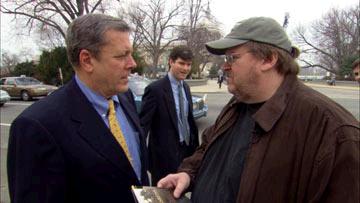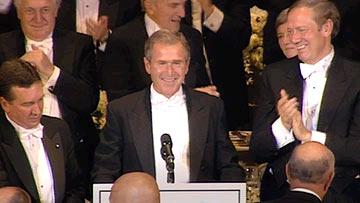

Michael Moore doesn't like George Bush. If that wasn't obvious to anybody, it will be immensely so after watching Fahrenheit 9/11. Moore is a polarizing figure that people tend to love or hate. Regardless of how one feels about his politics, this is a pretty interesting film to watch. The important thing to remember is that this movie is not a documentary in the sense that it is a balanced story that tries to tell all sides of a story. Moore himself has likened it to an op-ed piece, and it is very good one. Moore is a very smart guy. He's also very funny, and both these traits always come out in his films. He is also a master of self-promotion, stoking all sorts of controversy (real or imagined) that only serve to give him more publicity. Everybody remembers his tasteless speech at the Academy Awards. He complained to the world when Disney CEO Michael Eisner refused to release the film citing political content in an election year. He just happened to complain right before the Cannes film festival (where it won the Palme D'Or), even though Eisner had made these statements over a year ago. He whined about the R rating, although it is well deserved (one or two ‘f’; words are popping up in PG-13, four in less than a minute are not).
Moore's personality is his greatest asset, and also his greatest weakness. One noticeable difference in Fahrenheit 9/11 is that he is in the film a lot less. This is a good thing. His large, shambling everyman persona is too much of a distraction. Instead, he opts for voiceover, which either comes across as hilarious (to fans) or condescending (to non-fans). Moore (Bowling for Columbine, And Justice For All) presents one large argument about the failures of President George W. Bush and his connections to the House of Saud and the bin Laden family. He relentlessly pummels Bush the person and recounts fact after fact of the close relationships between the Saudis and the Bushes. According to Moore, Bush always wanted to depose Saddam Hussein. The War in Iraq was a preordained event, it was just a matter of justifying how it would happen, and 9/11, Al Queda, and Afghanistan was just the excuse. Moore presents Bush as an ineffective, unsure President, relying on his advisors to make decisions for him. Moore is fantastic in editing, splicing together clips of Bush and other government officials to make them look as dumb as possible. He uses music, subtitles, and other elements to his favor, working together his argument. And there is some compelling information here. Why are so many of Bush's associates from his past companies in the governments and running companies in the Afghanistan and Iraq? It certainly looks like Bush is paying back old oil industry contacts.
However, Moore always is slippery with the facts, and this is the most frustrating thing about him. Because this is his opinion, he is going to use the facts to his advantage. He typically takes things a step further and may go as far as twisting some of the facts. Doing this does not help his argument, because it just blows holes into his film. It makes people that hate him hate him, more, and his fans just gloss over it. Moore also likes to take the cheap shot, and does so again here. He has lots of footage of Bush, Colin Powell, Dick Cheney, Condoleeza Rice, and other administration officials looking stupid in front of the camera before their interviews officially being. Well, everybody, even Democrats will look that way (although Paul Wolfowitz licking his comb is especially disturbing). He mocks Bush's Coalition of the Willing, saying that countries like Palau, Romania, Costa Rica, and Iceland can contribute little if not nothing to Afghanistan, while neglecting to mention other Coalition members like Great Britain, Spain, and Australia. He does take the time to interview a lot of government officials (usually Democrats) but again takes the time interview Joe Idiot on the Street, who is typically uninformed but will sure say something funny. Another time, Moore points out that members of the bin Laden and Saud family flew out of the country before restrictions on air flight were lifted. This shows the connections they had. Well, the government commission on 9/11 and even administration detractor Richard Clarke (who is in the film agreeing with Moore on other points) think otherwise. And while his editing does make things funnier, it's important to remember that he probably has hundreds of hours of his subjects speaking, so he is missing a lot of context when he puts those edits together.
It's a real shame that Moore has this habit of fudging facts. It's hard to believe what he presents when people have to wonder how much of it is true and how much is Moore spinning the facts. Moore is a good filmmaker, and with all the fact straight he could make a powerful film. The emotional highlight of Fahrenheit 9/11 comes when he interviews Lila Lipscomb, from his hometown of Flint Michigan. Lipscomb is a supporter of the war and of Bush, and her son is overseas serving. Her views change drastically once her son dies in combat. It is heartbreaking watching her try to come to terms with her loss and examining her beliefs and why they changed. As annoying as Moore can be, it is his right to say what he says. This movie will probably not change the minds of anybody, especially anybody who follows the news, but it will foster some interesting discussion. It is interesting to watch this film, just to see why Moore thinks the way he does, and then dissect his argument to see if it holds up. Within the bounds of the film itself, it does. With a little more research, a lot of it doesn't.